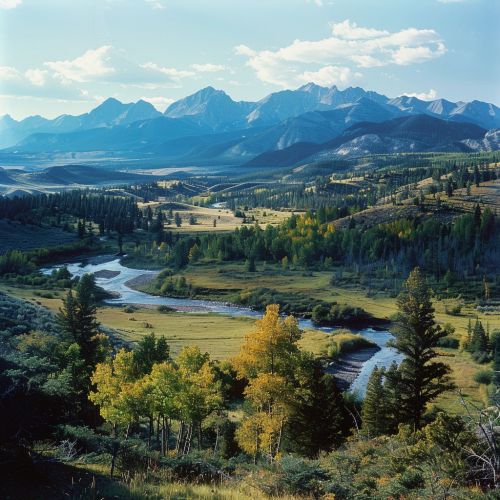Western Governors Association
Overview
The Western Governors Association (WGA) is a non-partisan organization of U.S. governors representing 19 western states and three U.S. territories. Founded in 1984, the WGA addresses important policy and governance issues in the Western United States, focusing on areas such as natural resources, environmental quality, economic development, and public health. The association serves as a platform for collaborative policy-making, advocacy, and the exchange of best practices among its member states and territories.
History
The WGA was established in response to the unique challenges and opportunities faced by the western states, which often differ significantly from those in other regions of the United States. The founding governors recognized the need for a collective voice to address issues such as water rights, land management, and energy development. Over the years, the WGA has evolved to include a broader range of policy areas, reflecting the changing priorities and concerns of its members.
Structure and Governance
The WGA operates under a set of bylaws that outline its governance structure, including the roles and responsibilities of its officers and committees. The association is governed by the Western Governors, who meet twice a year at the WGA's annual and winter meetings. The WGA is led by a Chair and a Vice-Chair, who are elected by their peers for one-year terms. The Chair sets the policy agenda for the association during their tenure.
The WGA's work is supported by a small professional staff based in Denver, Colorado. The staff is responsible for coordinating the association's activities, conducting research, and providing logistical support for meetings and initiatives.
Policy Areas
Natural Resources and Environment
One of the primary focuses of the WGA is the management and conservation of natural resources. The western states are home to vast public lands, forests, and water resources, which require careful stewardship to balance environmental protection with economic development. The WGA addresses issues such as water rights, forest management, wildlife conservation, and climate change adaptation.
The association has been instrumental in promoting collaborative approaches to land management, involving federal, state, and local agencies, as well as private stakeholders. The WGA's initiatives in this area include the Western Governors' Drought Forum, which facilitates the sharing of best practices for drought management, and the Western Governors' Species Conservation and Endangered Species Act Initiative, which seeks to improve the implementation of the Endangered Species Act.
Energy and Infrastructure
The western states are rich in energy resources, including fossil fuels, renewable energy sources, and critical minerals. The WGA works to promote the responsible development of these resources, while also addressing the infrastructure needs of the region. The association's energy policy initiatives focus on issues such as grid reliability, energy efficiency, and the integration of renewable energy into the power grid.
The WGA has also been active in advocating for federal policies that support the development of critical infrastructure, including transportation, broadband, and water systems. The association's efforts in this area include the Western Governors' Broadband Initiative, which aims to expand high-speed internet access in rural and underserved areas.
Economic Development
Economic development is a key priority for the WGA, as the western states seek to diversify their economies and create opportunities for their residents. The association's economic development initiatives focus on areas such as workforce development, innovation, and entrepreneurship. The WGA works to promote policies that support small businesses, attract investment, and foster the growth of key industries, such as technology, agriculture, and tourism.
The WGA also addresses the unique economic challenges faced by rural and tribal communities in the western states. The association's efforts in this area include the Western Governors' Rural Development Initiative, which aims to improve the quality of life and economic prospects of rural residents.
Public Health and Safety
Public health and safety are critical concerns for the western states, particularly in light of the region's diverse geography and population. The WGA addresses issues such as emergency preparedness, healthcare access, and substance abuse prevention. The association's public health initiatives include the Western Governors' Public Health and Safety Initiative, which focuses on improving the coordination of public health services and enhancing the region's capacity to respond to emergencies.
The WGA has also been active in addressing the opioid crisis, which has had a significant impact on many western states. The association's efforts in this area include promoting the use of evidence-based practices for substance abuse treatment and prevention, as well as advocating for federal support for state and local initiatives.
Key Initiatives and Programs
Western Governors' Drought Forum
The Western Governors' Drought Forum is a key initiative of the WGA, aimed at improving the region's resilience to drought. The forum brings together stakeholders from across the western states to share best practices, develop innovative solutions, and coordinate drought response efforts. The forum's activities include workshops, webinars, and the publication of resources and case studies.
Western Governors' Species Conservation and Endangered Species Act Initiative
The Western Governors' Species Conservation and Endangered Species Act Initiative seeks to improve the implementation of the Endangered Species Act (ESA) by promoting collaborative conservation efforts. The initiative focuses on enhancing the role of states in species conservation, improving the regulatory framework of the ESA, and promoting voluntary conservation measures. The initiative's activities include stakeholder meetings, policy recommendations, and the development of conservation plans.
Western Governors' Broadband Initiative
The Western Governors' Broadband Initiative aims to expand high-speed internet access in rural and underserved areas of the western states. The initiative focuses on identifying barriers to broadband deployment, promoting public-private partnerships, and advocating for federal support for broadband infrastructure. The initiative's activities include stakeholder engagement, policy recommendations, and the development of best practices for broadband expansion.
Western Governors' Rural Development Initiative
The Western Governors' Rural Development Initiative seeks to improve the quality of life and economic prospects of rural residents in the western states. The initiative focuses on areas such as workforce development, infrastructure, and access to services. The initiative's activities include stakeholder engagement, policy recommendations, and the development of resources and tools for rural communities.
Western Governors' Public Health and Safety Initiative
The Western Governors' Public Health and Safety Initiative focuses on improving the coordination of public health services and enhancing the region's capacity to respond to emergencies. The initiative addresses issues such as emergency preparedness, healthcare access, and substance abuse prevention. The initiative's activities include stakeholder engagement, policy recommendations, and the development of resources and tools for public health professionals.
Collaboration and Partnerships
The WGA collaborates with a wide range of partners, including federal agencies, non-profit organizations, academic institutions, and the private sector. These partnerships are essential for the success of the association's initiatives, as they bring together diverse expertise and resources to address complex challenges.
The WGA has established formal partnerships with several federal agencies, including the U.S. Department of the Interior, the U.S. Department of Agriculture, and the U.S. Department of Energy. These partnerships facilitate the coordination of federal and state efforts on issues such as land management, energy development, and public health.
The WGA also works closely with non-profit organizations and academic institutions to conduct research, develop policy recommendations, and implement programs. These collaborations help to ensure that the association's initiatives are informed by the latest scientific and policy research.
Impact and Achievements
The WGA has made significant contributions to policy and governance in the western states. The association's initiatives have led to the development of innovative solutions to complex challenges, the adoption of best practices, and the improvement of coordination among stakeholders.
One of the key achievements of the WGA is its role in promoting collaborative approaches to land management. The association's efforts have helped to improve the management of public lands, enhance wildlife conservation, and address the impacts of climate change. The WGA's work on drought resilience has also been widely recognized, with the Western Governors' Drought Forum serving as a model for other regions.
The WGA's energy policy initiatives have contributed to the development of a more reliable and sustainable energy system in the western states. The association's efforts to promote the integration of renewable energy, improve grid reliability, and expand broadband access have had a positive impact on the region's economy and quality of life.
The WGA's public health and safety initiatives have also made a significant impact, particularly in addressing the opioid crisis and improving emergency preparedness. The association's work in this area has helped to enhance the capacity of public health systems and improve the coordination of services.
Challenges and Future Directions
Despite its many achievements, the WGA faces several challenges in its efforts to address the complex and evolving issues facing the western states. One of the key challenges is the need to balance competing interests and priorities, particularly in areas such as land management and energy development. The WGA must also navigate the complexities of federal-state relations and advocate for policies that reflect the unique needs of the western states.
Looking to the future, the WGA is focused on continuing to promote collaborative approaches to policy-making and governance. The association is committed to addressing emerging challenges, such as the impacts of climate change, the need for infrastructure investment, and the importance of economic diversification. The WGA will also continue to advocate for federal policies that support the region's priorities and enhance the capacity of state and local governments.
See Also
- National Governors Association
- Council of State Governments
- Interstate compacts in the United States
References


